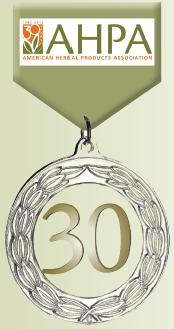Since its beginnings in 1982, the American Herbal Products Association (AHPA) has been a vehicle to voice the concerns and ideals of herbal and botanical companies. Thirty years later, AHPA is still one of the strongest and oldest non-profits of its kind.
Through its three-pronged mission—representation, education and communication—AHPA works to give members the tools they need to be successful businesses and have a powerful collective voice on Capitol Hill.
Representation
 Three decades ago, at a time when the industry was just starting to blossom, it was clear that herbal companies needed a unifying body. AHPA was founded with the intention of filling that void, and to give the herbal products industry “a forum in which common interests could be discussed,” says the group’s president Michael McGuffin.
Three decades ago, at a time when the industry was just starting to blossom, it was clear that herbal companies needed a unifying body. AHPA was founded with the intention of filling that void, and to give the herbal products industry “a forum in which common interests could be discussed,” says the group’s president Michael McGuffin.
AHPA currently has 280 members and continues to enjoy growth. “We believe the best way to add new members is to do good work and to maintain visibility in the marketplace,” says McGuffin. “I certainly think that companies that [participate in any trade association] are well served, and are able to significantly contribute to a community where companies are in competition, but often are partners. We all have common interests.”
Members get more advantages than simply interacting with like-minded companies. Businesses, especially small firms, benefit from AHPA’s regulatory and legislative expertise. AHPA engages federal agencies, keeps up relationships with legislators, monitors regulatory activity, acts as a spokesperson in the media, keeps an eye on new herb-/botanical-related science and more. Says McGuffin. “Most small companies are too busy to do that, so we represent the trade in our regulatory, legislative relationship.”
This is important, especially in recent years as the industry is regularly attacked by menacing legislation and slanted media. For example, the group swiftly addressed concerns from Senator Richard Durbin (D-IL) regarding the Chicago Tribune’s blasting of the industry’s incompliance with the newly established Current Good Manufacturing Practices (cGMPs). McGuffin took the initiative to meet with Durbin’s staff and “communicated first and foremost our agreement that our goal is perfection, and that we are not surprised that not everyone came into compliance with the new rule [released only five years ago] the day it was posted.”
He calls our attention to a similar situation in 1997 when the manufacturing practices for seafood were changed. Five years after the new laws were passed, only 54% of manufacturers were in complete compliance, similar to today’s situation. “We are constantly communicating with our legislatures some contextual data so that they understand that this is not a willful oversight,” says McGuffin. “It’s a tough rule we have to come into compliance with.”

|
|
|
Michael McGuffin, AHPA President |
Education
With cGMPs and other issues, AHPA feels compliance is a top priority, and gives members the know-how with helpful educational seminars. Members and nonmembers alike are invited to attend AHPA’s informative webinars, teleseminars—both accompanied by written documents—and in-person events. These seminars could touch on anything from the proposed New Dietary Ingredients guidance and filings to ensuring ingredient cleanliness to managing FDA site inspections, just to name a few.
McGuffin explains how they determine which topics are the most pressing, and how to present them: “We have an Education Committee that usually meets jointly with our Small Business Committee, and we ask them where we need more information.”
These valuable educational programs won’t be put on the back burner any time soon. McGuffin feels it’s imperative that members (and nonmembers) stay up-to-date on any revisions or new regulations and laws that affect the industry. Companies should have the tools they need to stay in compliance with current regulations, he believes, and AHPA it isn’t doing its job unless it delivers members these vital resources.
Communication
In an effort to connect with the industry on all fronts, McGuffin and his team regularly communicate with AHPA members. He and his staff personally call each and every associated company at least once a year to keep themselves updated on their businesses and to receive feedback on AHPA’s own doings. “I’m interested in hearing about their businesses, and I am willing to ask if they want to talk about anything we’re doing. And they’re not shy,” says McGuffin. “They usually say, ‘Yes, I’ve been meaning to talk to you about that thing you’re doing.’”
McGuffin takes communication a step further by making it a two-way street. “We try to make it clear that I’m available at any time,” he says. “And that is true with all the senior staff. I pick up my phone and make myself available.”
Unwavering Leadership
Most importantly, AHPA has created meaningful and positive improvements in the industry. The group is proud of the opportunities it has created for its members, of the new legislation it has helped shape and, most of all, of its continuous, strong leadership in the herbal and botanical community. In 2011, McGuffin and AHPA received the Nutrition Business Journal’s Business Achievement Award for his Efforts on Behalf of the Industry, but McGuffin is holding his focus on the larger picture for AHPA’s future.
“I can point out individual examples [of our greatest accomplishments], but to some degree, an individual accomplishment is distracting,” says McGuffin. “We could not have made any individual accomplishments if we did not have any organizational integrity to begin with. In a sense, I am saying one of our most significant accomplishments is maintaining an important leadership role for three decades. That in itself is a significant accomplishment.”
Well said, Mr. McGuffin. Congratulations, AHPA, on 30 strong years as a salient industry leader, and here’s to another 30-plus years of success! WF
Published in WholeFoods Magazine, September 2012









